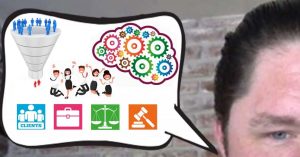This is a video that I made to demonstrate the capabilities of the Google Chrome YouTube AI Transcript Summary Extension used to pull out the transcript of my video and then the excellent capabilities of ChatGPT to clean up the transcript by asking it this simple prompt and then pasting the transcript, “you are a world class transcriber and use perfect grammar and punctuation in your editing. please edit this transcription that came from a video for perfect punctuation, spelling, grammar and remove the ums and other similar vocalizations:”
I was thinking about some of the things people say about blame games versus how we say they’re not about blame, because we’re describing a situation as it actually occurred. What it usually means is that you need to see it as an exercise in finding a way to make it your fault when something didn’t happen the way you wanted it to, or that you didn’t do something that was in your power. That’s what it is. You have to shift your focus.
If you find yourself in a friendship with someone who cares about you, and they are always saying that type of thing, don’t argue with them. What I think you should do is find a way to express what you know you had the power to do differently and acknowledge it. If the topic comes up, say, “I know I had the ability to do this differently, and now, moving forward, I’m handling similar situations in another way.”
 Sometimes, it’s a matter of needing to take action, like suing, in a timely fashion, which wasn’t done. Then, the conversation shifts to what someone else did, acknowledging that while they did those things, action on our part was necessary within a specific timeframe. It’s about not being a doormat in life; sometimes, you just have to stand up in conversations but remain civil, rather than letting things slide. This is how arguments with secondary and tertiary friends, associates, and acquaintances begin: by standing up too late for something that happened with someone else.
Sometimes, it’s a matter of needing to take action, like suing, in a timely fashion, which wasn’t done. Then, the conversation shifts to what someone else did, acknowledging that while they did those things, action on our part was necessary within a specific timeframe. It’s about not being a doormat in life; sometimes, you just have to stand up in conversations but remain civil, rather than letting things slide. This is how arguments with secondary and tertiary friends, associates, and acquaintances begin: by standing up too late for something that happened with someone else.
You get into a cycle. Some people don’t, but it’s a common issue. If you had a track record of not doing this and started at a younger age or learned to do it, maybe there’s a few who just always accept fault and take responsibility. I think those types of motivational and self-help concepts need to be discussed with someone you trust, who isn’t going to continue the cycle of blame.
I’ve learned not to be accusatory myself. Initially, I might have been perceived as not thinking critically about what someone was telling me because others would hear me listening and agree without considering the full context. It’s challenging when there’s an obvious issue that someone did wrong. I don’t always call people out because I think I haven’t heard the whole story, and I worry they’ll shut down and not share all the details. Sometimes, I just try to change the subject or talk about something else.
Not everyone shares the same personal philosophies. For example, some people may want to do more at work than is required, and that doesn’t make someone wanting to do less a bad employee; they’re just meeting expectations. You can get caught in a “black hole” spiral of conversations if someone labels you as someone who plays the blame game. You might have to step away and be around other people for a bit, but try to keep good thoughts about the person because, generally, people want what’s good for us all.
For a while, I took opportunities to voice harsh and critical thoughts immediately, rather than letting them fester, because I let some situations and people take advantage of me in the past. I thought they were doing the wrong thing. However, I don’t think confrontation is always the way. It’s good to temper criticism with positive feedback, like the “One Minute Manager” suggests: offer a one-minute critique and a one-minute praise. My high school football coach gave me that book years ago, and reading it years later, when I was an assistant manager at a gas station, proved valuable. Now, as a supervisor with a private patrol officer crew, I find it’s not hard to recognize the good things people do and advise them on how to do other things differently. Maybe I just have the right job for that.
Life takes its twists and turns.